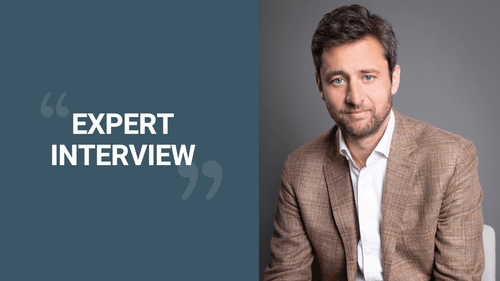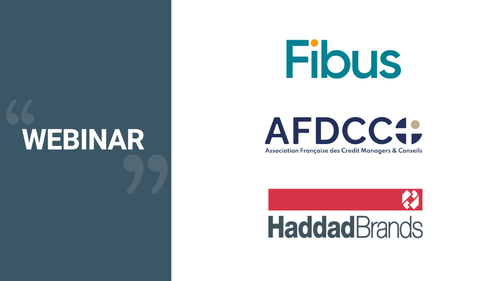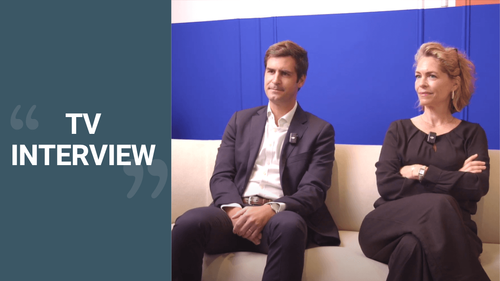Fibus on BFM.TV's Décryptage programme with Stéphane Pedrazzi
Discover the Décryptage programme conducted by Stéphane Pedrazzi, a BFMTV business journalist, who interviews Thibaut Robet and Maxime Bertin. The Managing Director and Factoring Director of Fibus answer the following questions:
▪ To what extent is factoring a solution for financing growth?
▪ What is the potential of the factoring market?
▪ How do you set up a factoring contract?
▪ How do its digital solutions enable Fibus to stand out from the competition?
▪ How much does factoring cost?
▪ To what extent is factoring a solution for financing growth?
▪ What is the potential of the factoring market?
▪ How do you set up a factoring contract?
▪ How do its digital solutions enable Fibus to stand out from the competition?
▪ How much does factoring cost?


Interview with Thibaut Robet and Maxime Bertin by BFMTV
Transcription of the interview:
Stéphane Pedrazzi Hello! Welcome to ‘Décryptage’, the programme that gives a voice to sector-specific experts. Today, we’re gong to talk about factoring. Factoring is a source of financing that’s sometimes seen as a last resort. Yet as we’ll see, it’s a way to finance the growth of firms. We’re going to discuss that with Thibaut Robet. Hello.
Thibaut Robet Hello.
S.P. You’re the founder and managing director of Fibus, a firm in consultancy, brokerage and digital solutions for factoring and credit insurance. We’ll be explaining all that. And you’re with Maxime Bertin. Hello Maxime. You’re the factoring director of Fibus. We’ll start with you to briefly explain the idea of factoring and, above all, clarify the financial leverage that it can offer.
Maxime Bertin Factoring is a technique for short-term financing that helps B-to-B firms finance their accounts receivable. A firm will grant their client a payment period, which is usually 60 days, and factoring will help that firm get immediate payment of their invoice through a factor – a factoring firm. In terms of amounts gained, we consider it represents two months of revenue. For example, take a firm that makes €30m in revenue. That firm can expect to get around €5m in financing.
S.P. That’s of course a significant amount. Thibaut, you say it’s a way to finance growth.
T.R. Absolutely. In your introduction, you were talking about how we tend to imagine factoring as a solution for firms in distress. But in reality, the need for liquid assets, the need for financing, is born of growth. And factoring is a solution that supports and follows a firm’s evolution. With factoring, a company director doesn’t have to worry about their financial resources.
S.P. However, some company directors still see factoring in a negative light. How do you explain that?
T.R. I think it’s a historical trend.
S.P. Why? Because they consider it’s a solution intended for firms in distress?
T.R. Yes, because it’s a solution that firms in distress have de facto access to. But if we look back in time, in the 1980s, when you set up factoring, you were under obligation to declare it. You had to tell your clients about it. Then, in the late 1990s, factoring became confidential. And many firms started using it as a management tool.
S.P. But does factoring correlate to economic cycles? I’m asking both of you. Is there more factoring during crises? Or is the opposite true?
T.R. Yes, it’s the exact opposite. There’s much more factoring during periods of growth.
S.P. That debunks a myth about factoring.
T.R. Absolutely – it’s a real misconception.
S.P. How is France positioned in this market, Maxime? For financial products, France often lags behind English-speaking countries. Is that true for factoring too?
M.B. No – the opposite is true. French factoring firms are among Europe’s biggest ones. The French market is the biggest factoring market in Europe with receivables worth a total of €422bn bought last year. And we’re fortunate enough to work with French factoring firms that are able to operate throughout Europe and even further afield – in North America and Asia.
S.P. Does that mean French firms use factoring a lot? Do we have any figures for that? Do we know how many medium-sized firms are eligible?
T.R. We consider than one in two B-to-B firm uses factoring, so that’s substantial. There are 33,000 firms using factoring in France and between 5,000 and 6,000 medium-sized firms in France.
S.P. So there’s huge potential on the French market. Is factoring comfortable for banks too?
T.R. Yes, because it’s a way for a bank to safeguard its financing. And that makes it possible for a bank to go further in its support for clients by taking fewer risks.
S.P. Let’s look at practical matters. Maxime, that’s your job. Let’s have a sort of tutorial. How does it work in practice? Let’s imagine I’m a company director and I want to set up a factoring solution. What are the steps for doing that?
M.B. Well, first, you should come and see me.
S.P. At Fibus?
M.B. Yes, at Fibus. What we’ll do first, to help you, is calculate the financing potential you could have. That’s a way to confirm you’re eligible for our solution and to find out if your accounts receivable can produce a source of financing. Once we’ve carried out this analysis, we support you in finding the right financial partner, the one that best matches your firm’s characteristics. And once we’ve found this partner, we go through a traditional credit process in banks. Then, when we’ve reached an agreement, we help you implement the solution operationally. That’s because it’s a source of financing that can be complex and that can affect the way in which the firm is organised. We support you throughout this project. And once the financing has got underway, we don’t disappear. We stay by your side in case you have areas you want to optimise, renegotiate or extend if you have other subsidiaries in your group.
S.P. You mentioned complexity. Does that mean you necessarily have to be supported?
T.R. It’s good to be supported. The support helps you sustain your project for a given period.
S.P. And, as Maxime said, you should find out whether your firm can benefit from factoring.
T.R. Yes, that initial upstream phase is very important as it helps quantify the financial contribution of the factoring. That’s crucial to determine. Some activities are eligible for factoring. But others aren’t eligible.
There are countries where factoring is carried out more easily or less easily. What’s more, the nature of your clients determines whether you can use factoring. And in your client receivables as a whole, we have to determine what the best portion is to use for factoring.
S.P. Let’s talk a bit about you now. You’re a French firm, but you don’t only work with French clients. You’re present in roughly 40 countries, aren’t you?
T.R. We’re not physically present in 40 countries.
S.P. But what about your clients?
T.R. Our clients are present in 37 countries. French factoring is exported successfully. International companies like to call upon French factoring firms. And French factoring firms like to export their know-how.
S.P. Is being a French firm a prestigious hallmark and an advantage in this field?
M.B. Yes, it’s a bonus in this market.
S.P. In the introduction, I mentioned your digital offer in factoring and credit insurance. How does that help you stand out from the competition? I don’t know who wants to answer that.
T.R. Well, we help our clients choose both their factoring solutions and service providers. We help them set all that up. And with our 18 years’ experience today, we’ve noticed that we’ve had to constantly optimise these factoring contracts. And we’ve put all this know-how, which we’ve gained over time, into software solutions that we make available to our clients so they can use factoring in the best possible way. This is an important topical issue today, especially after the rise in interest rates in 2023. When we set up factoring, we want to make optimal use of it.
S.P. But what exactly is it, Maxime? Is it a sort of digital dashboard for overseeing the project?
M.B. Yes, but it’s a bit more than that. It’s a software program that connects to a firm’s ERP system to collect all data relating to invoicing and clients. This software helps the finance department understand what is transferred through the factoring programme and what could be, and what potential sources of financing the firm could still produce. And it helps them oversee their factoring programme in regard to financing obtained versus the costs.
S.P. We haven’t yet talked about the cost for firms. Isn’t the cost also a factor that perhaps explains the negative image of factoring that some company directors have? Let me ask you the question differently: Is factoring expensive for firms?
M.B. No. There’s a cost, of course. But factoring remains the most attractive source of short-term financing. In rough terms, the cost of factoring is traditionally between 1 and 2.5 percent above the Euribor index. So it’s one of the most attractive sources of short-term financing.
S.P. And what determines this cost between 1 and 2.5 percent? Is it the firm’s size? Its financial solidity?
M.B. Yes, the level of financing, the firm’s financial solidity, the number of countries, the currency, etc.
S.P. Thank you, both of you, for having explained a little about how this works and the benefits of factoring that firms can enjoy. If we sum up, what is it basically all about? What would the three keywords be? Growth, which you can finance via factoring, for medium-sized firms, and with an international dimension. Would that sum it up well?
T.R. You’ve summed It up well. I’ve got nothing to add. Thanks a lot, Stéphane!
S.P. Thank you both for coming on our TV programme. Thibaut Robet, the founder and managing director of Fibus, and Maxime Bertin, the factoring director of Fibus too. See you soon for more deciphering on ‘Décryptage’.
Thibaut Robet Hello.
S.P. You’re the founder and managing director of Fibus, a firm in consultancy, brokerage and digital solutions for factoring and credit insurance. We’ll be explaining all that. And you’re with Maxime Bertin. Hello Maxime. You’re the factoring director of Fibus. We’ll start with you to briefly explain the idea of factoring and, above all, clarify the financial leverage that it can offer.
Maxime Bertin Factoring is a technique for short-term financing that helps B-to-B firms finance their accounts receivable. A firm will grant their client a payment period, which is usually 60 days, and factoring will help that firm get immediate payment of their invoice through a factor – a factoring firm. In terms of amounts gained, we consider it represents two months of revenue. For example, take a firm that makes €30m in revenue. That firm can expect to get around €5m in financing.
S.P. That’s of course a significant amount. Thibaut, you say it’s a way to finance growth.
T.R. Absolutely. In your introduction, you were talking about how we tend to imagine factoring as a solution for firms in distress. But in reality, the need for liquid assets, the need for financing, is born of growth. And factoring is a solution that supports and follows a firm’s evolution. With factoring, a company director doesn’t have to worry about their financial resources.
S.P. However, some company directors still see factoring in a negative light. How do you explain that?
T.R. I think it’s a historical trend.
S.P. Why? Because they consider it’s a solution intended for firms in distress?
T.R. Yes, because it’s a solution that firms in distress have de facto access to. But if we look back in time, in the 1980s, when you set up factoring, you were under obligation to declare it. You had to tell your clients about it. Then, in the late 1990s, factoring became confidential. And many firms started using it as a management tool.
S.P. But does factoring correlate to economic cycles? I’m asking both of you. Is there more factoring during crises? Or is the opposite true?
T.R. Yes, it’s the exact opposite. There’s much more factoring during periods of growth.
S.P. That debunks a myth about factoring.
T.R. Absolutely – it’s a real misconception.
S.P. How is France positioned in this market, Maxime? For financial products, France often lags behind English-speaking countries. Is that true for factoring too?
M.B. No – the opposite is true. French factoring firms are among Europe’s biggest ones. The French market is the biggest factoring market in Europe with receivables worth a total of €422bn bought last year. And we’re fortunate enough to work with French factoring firms that are able to operate throughout Europe and even further afield – in North America and Asia.
S.P. Does that mean French firms use factoring a lot? Do we have any figures for that? Do we know how many medium-sized firms are eligible?
T.R. We consider than one in two B-to-B firm uses factoring, so that’s substantial. There are 33,000 firms using factoring in France and between 5,000 and 6,000 medium-sized firms in France.
S.P. So there’s huge potential on the French market. Is factoring comfortable for banks too?
T.R. Yes, because it’s a way for a bank to safeguard its financing. And that makes it possible for a bank to go further in its support for clients by taking fewer risks.
S.P. Let’s look at practical matters. Maxime, that’s your job. Let’s have a sort of tutorial. How does it work in practice? Let’s imagine I’m a company director and I want to set up a factoring solution. What are the steps for doing that?
M.B. Well, first, you should come and see me.
S.P. At Fibus?
M.B. Yes, at Fibus. What we’ll do first, to help you, is calculate the financing potential you could have. That’s a way to confirm you’re eligible for our solution and to find out if your accounts receivable can produce a source of financing. Once we’ve carried out this analysis, we support you in finding the right financial partner, the one that best matches your firm’s characteristics. And once we’ve found this partner, we go through a traditional credit process in banks. Then, when we’ve reached an agreement, we help you implement the solution operationally. That’s because it’s a source of financing that can be complex and that can affect the way in which the firm is organised. We support you throughout this project. And once the financing has got underway, we don’t disappear. We stay by your side in case you have areas you want to optimise, renegotiate or extend if you have other subsidiaries in your group.
S.P. You mentioned complexity. Does that mean you necessarily have to be supported?
T.R. It’s good to be supported. The support helps you sustain your project for a given period.
S.P. And, as Maxime said, you should find out whether your firm can benefit from factoring.
T.R. Yes, that initial upstream phase is very important as it helps quantify the financial contribution of the factoring. That’s crucial to determine. Some activities are eligible for factoring. But others aren’t eligible.
There are countries where factoring is carried out more easily or less easily. What’s more, the nature of your clients determines whether you can use factoring. And in your client receivables as a whole, we have to determine what the best portion is to use for factoring.
S.P. Let’s talk a bit about you now. You’re a French firm, but you don’t only work with French clients. You’re present in roughly 40 countries, aren’t you?
T.R. We’re not physically present in 40 countries.
S.P. But what about your clients?
T.R. Our clients are present in 37 countries. French factoring is exported successfully. International companies like to call upon French factoring firms. And French factoring firms like to export their know-how.
S.P. Is being a French firm a prestigious hallmark and an advantage in this field?
M.B. Yes, it’s a bonus in this market.
S.P. In the introduction, I mentioned your digital offer in factoring and credit insurance. How does that help you stand out from the competition? I don’t know who wants to answer that.
T.R. Well, we help our clients choose both their factoring solutions and service providers. We help them set all that up. And with our 18 years’ experience today, we’ve noticed that we’ve had to constantly optimise these factoring contracts. And we’ve put all this know-how, which we’ve gained over time, into software solutions that we make available to our clients so they can use factoring in the best possible way. This is an important topical issue today, especially after the rise in interest rates in 2023. When we set up factoring, we want to make optimal use of it.
S.P. But what exactly is it, Maxime? Is it a sort of digital dashboard for overseeing the project?
M.B. Yes, but it’s a bit more than that. It’s a software program that connects to a firm’s ERP system to collect all data relating to invoicing and clients. This software helps the finance department understand what is transferred through the factoring programme and what could be, and what potential sources of financing the firm could still produce. And it helps them oversee their factoring programme in regard to financing obtained versus the costs.
S.P. We haven’t yet talked about the cost for firms. Isn’t the cost also a factor that perhaps explains the negative image of factoring that some company directors have? Let me ask you the question differently: Is factoring expensive for firms?
M.B. No. There’s a cost, of course. But factoring remains the most attractive source of short-term financing. In rough terms, the cost of factoring is traditionally between 1 and 2.5 percent above the Euribor index. So it’s one of the most attractive sources of short-term financing.
S.P. And what determines this cost between 1 and 2.5 percent? Is it the firm’s size? Its financial solidity?
M.B. Yes, the level of financing, the firm’s financial solidity, the number of countries, the currency, etc.
S.P. Thank you, both of you, for having explained a little about how this works and the benefits of factoring that firms can enjoy. If we sum up, what is it basically all about? What would the three keywords be? Growth, which you can finance via factoring, for medium-sized firms, and with an international dimension. Would that sum it up well?
T.R. You’ve summed It up well. I’ve got nothing to add. Thanks a lot, Stéphane!
S.P. Thank you both for coming on our TV programme. Thibaut Robet, the founder and managing director of Fibus, and Maxime Bertin, the factoring director of Fibus too. See you soon for more deciphering on ‘Décryptage’.
These articles may interest you

How the Credit Manager safeguards the company’s cash flow
A function at the heart of financial stability The Credit Manager’s role extends far beyond preventing bad debt: today, they act as the true conductor of the order-to-cash process, ensuring the company maintains healthy, predictable, and actively managed cash flow. We
spoke with Thibaut Robet, CEO of Fibus, a firm specialising in order-to-cash management.
spoke with Thibaut Robet, CEO of Fibus, a firm specialising in order-to-cash management.

How can credit insurance support growth in a sector under pressure?
Economic difficulties are mounting and weighing more heavily on certain sectors: how can you make the Credit Manager a business partner who supports the company's growth? Discover the testimony of HADDAD BRANDS EUROPE in the webinar hosted by Alexia Monteillet, Credit Risk Manager at HADDAD BRANDS EUROPE, and Marc Chaquès, Credit Insurance Director at Fibus, in partnership with the AFDCC.

Factoring for LBO transactions
Deconsolidating, uncapped, quick to set up and inexpensive, factoring is the perfect financing solution to support the growth of LBO-backed companies.
- For 20 years, Fibus has been supporting private equity funds in France, the UK, Germany and the US.
- Four out of five transactions carried out for LBO-backed companies.
Contact us, so that, together, we can find the best solution for financing your accounts receivable.
Write us
